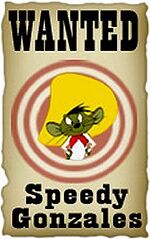Uncyclopedia:Choice of Words
Our style manual, How To Be Funny And Not Just Stupid, contains useful tips about writing comedy (including having a useful overall strategy for your article) and lists some common humor techniques.
But we mention that an entertaining read will lead us to forgive lapses in other areas, even in the key area of being funny. Below, we describe ways to write an entertaining article — even while you wait for the Rescue Squad to arrive with some actual humor!
Tactics
I see you have decided to do an article on Joseph Stalin and your comedy strategy is to portray him as stupid. Your tactic should not be to just say he is stupid. In fact, if the word "stupid" appears anywhere in your article, it is a surrender.
Wile E. Coyote (pictured) was the biggest sheer loser in the American Wild West. But in no episode of Roadrunner did Elmer Fudd or Foxhorn Leghorn simply amble onto your television screen and explain to you what a loser the coyote was. Instead, you saw a long series of failures to capture the roadrunner: sometimes from a stupid idea, sometimes from the roadrunner's guile, and sometimes for totally random reasons. (Long, but not boring, because each skit played out differently.) At the end of the show, you were saying to yourself, "What a loo-zah!" The writers never had to say it to you.
An Uncyclopedian who writes that "The Big Mac is a piece of dog shit on two buns" or "Manchester United are the best athletes in history" has picked the wrong strategy: Persuasion instead of humor. But he has also picked the wrong tactic: Simply stating his opinion rather than writing humor to coax you to adopt his opinion. The fact that he has an opinion (dog-shit negative or fan-boy positive) is not the problem; we all bring opinions with us. The problems were his strategy and his tactics. (More about this below, at Bias is not as good as humor.)
Choice of words

Now, in your article on Joseph Stalin, you've decided to make the point that his wife Edith was just as stupid. There is no time for a half dozen anecdotes on her stupidity, as she isn't the main topic. So you decide to keep it brief and just say so. Still, you have choices:
- "Edith was stupid."
- Not funny. It compels your reader to agree with you, it doesn't explain why, and it doesn't entertain. Nothing could be worse. (Sorry; it could be worse: "Edith was fucking stupid!!!" has the same problem, and it will induce thousands of people in the Central U.S. either to stop reading the article or to stop reading Uncyclopedia entirely.)
- "Edith was a blithering idiot."
- Flowery language is a little better, but remains the same bad tactic.
- "Edith was as dumb as a doorknob."
- This simile is more clever. It doesn't just insult; at least, until the reader works out how dumb a doorknob might be. After a moment thinking about a person sharing the intelligence of a round piece of brass, you might get a chuckle out of your reader.
- "Edith was several Budweisers short of a six-pack."
- Or "not the brightest bulb on the Christmas tree." Several logs shy of a cord, lacking something for a complete set. Having part of her brain missing. It's entertaining to use figures of speech to state the obvious without stating anything.
This sequence progresses from blunt to crafty, and crafty is better. Even if you fail to make the reader laugh with the point you are trying to make, you'll make him smile with the cleverness of your attempt.
All the above expressions have been used before. To keep the reader from groaning about that, and to use additional cleverness to entertain, pick an expression that also relates to some other theme in the article. Joseph Stalin, did we say? Perhaps "Edith was a few mules short of a good Collective Farm."
Best of all, don't discuss Edith's intelligence at all but use an anecdote to explain how stupidly she did something, so as to lead your reader to that conclusion without stating it.
Absurd word usage adds cleverness to an article. Groucho Marx once said, "Outside of a dog, a book is man's best friend. Inside of a dog, it's too dark to read." Here, the listener is ready for "inside" to be the opposite of "outside," but it isn't. This single word embodies the technique of misdirecting your reader.
Write with texture

You won't always be making a funny point. Some sentences simply give your reader enough background that he will get the joke when it comes. Even here, your writing can be fun to read and not simply factual.
- "Anne Boleyn was S.O.L. as her son was D.O.A."
- And thus didn't receive a push present: More amusing than just writing that she was "disfavoured as her son was stillborn."
- "A black hole that consumes everything around it like a relapsing alcoholic at an open bar"
- ...is at the heart of every galaxy. Analogies and similes supercharge anything you write.
- "Ralph Waldo Emerson may have remarked that 'John Brown will make the gallows glorious like the Cross,' but the gallows made John Brown dead like the doorknob."
- There is no quotation from Wikipedia that is so dry that you cannot play some sort of a game with it. This one slams the reader from glory down to death, using a reversal, parallel language, and alliteration at the end.
- "...a kidney punch is something the editors quaff with Diana when they can't get Aqua Velva. (Diana goes down easiest of all.)"
- In Dianalysis, kidney treatment becomes a kidney punch, which becomes a punch that you drink. Then is Diana a drink mixer, as you would drink after-shave lotion? or simply eager for oral sex? This is a rat's-nest of figurative language and double meanings. It makes no point at all, but it's fun to read, exactly because nothing about it is random.
Your single goal is the mirth of your reader. If your article still has a sentence that doesn't somehow contribute to that goal, there is more work to do.
Put the punch line last. Arrange your sentence so it sets up the joke and then delivers it. If the funny concept is in the middle of the sentence, any following text you have to write to complete the thought is dead weight that spoils the moment — an epilogue essentially explaining the joke to the reader, and no one enjoys that.
Double meanings
Now more about that last example. It makes you laugh to write about sex, because surely you are a twelve-year-old who can't stop thinking about the fact that your schoolmarm has tits, and probably a pussy too. Unfortunately, we are here to get you to think about your reader, who is a middle-aged man who barely has any feeling left below the waist. How will you make him laugh?
One sure way is with the double meaning (double entendre for those who like it French): by writing about sex without putting sex into words. "Going down," above, had a double meaning. So do words like "come" and "pull," and a hundred others, if you are like the young sidekick of Finnbarr Saunders of the British comic strip. The goal is not to string these non-naughty words together to tell a naughty story. The clever thing is to write a paragraph that tells a simple story but at the same time tells a sexual story, when read that way.
Double meanings don't have to be about sex at all. A paragraph that neatly tells two different stories with the exact same sequence of words is a work of art. Not that we're going to pay you even to do that.
A simple style is most encyclopedic

The simple indicative mood is authoritative. Using extra words to make an article more authoritative — or so that it reads like an encyclopedia — only makes it longer and harder to read. (None of us here is paid by page count.) Please reconsider if you start a sentence with a cliché such as:
- It is generally agreed that...
- Scientists have determined that...
- A majority of those polled believe that...
If this were a real encyclopedia, you would have to provide citations for the above. (Which scientists? Who was polled?) You don't have to do so here; and any citations you do give might be deleted for the sake of humor. So just make your statement; don't start by giving the reason why it's true. (Besides, telling the reader how to interpret a fact, even before you state it, is for kids who have always been told how smart they are. Forgive us if you are one — but there's still time to learn.)
Likewise, avoid starting a sentence with "Contrary to public opinion...." especially if you're trying to adhere to some "correct" form. State what you want to state; ask yourself if it is funny; then ask yourself whether it really adds anything to say that everyone believes otherwise. A fact that is obviously in conflict with widespread opinion may be funny on that basis — but saying so may spoil the joke by explaining it.
Gender issues
The traditional grammar rule is to write he, his, and him, even when the person might be female; the modern trend is for impartiality toward the sexes, to avoid alienating readers who might not be male. It is fine to choose alternatives to single-gender terms — police officer is better than policeman. Waiter often includes both sexes, so unless there's a comedy point to noting that the waitstaff is female, writing "Then the waiter said..." is fine.
However, Uncyclopedia's goal is to make people laugh, not to showcase inclusiveness; he or she is simply bad writing, and the person asked themself is not even English. You are trying to amuse your reader, but you interrupt the process by answering a question the reader was probably not even asking: Could this person be female? She usually could — but it's a digression that is going to blunt your joke. Sometimes you can rewrite a sentence to avoid gender-specific pronouns, but don't do it when the result is simply awkward.
Bias is not as good as humor
Articles heavy with your personal bias are sure to put off readers with the opposite bias, and may be pointless even to readers who agree with you.
- Rants are not funny, even if done jauntily. While you surely have a point of view that will affect your choice of article, approach, and words, above we made the distinction between hitting your reader over the head with a hammer and gently inducing him to come around to your view.
- Male chauvinism is not funny. Jokes about women needing to be in the kitchen, barefoot, or pregnant are demeaning. They could be acceptable coming from Archie Bunker, but an article that asks the reader to assume that a specific character is doing the writing is hard to do well. Learn the difference between suggesting there is something wrong with the narrator (perhaps he is a hopeless lecher, as in Genevieve Gorder) and that there is something wrong with more than half of your audience.
Sarcasm can come off as resentful or bitter. For example:
- "America had some goodwill in the world. Who would want that? After all, you can’t take goodwill to the bank. (Or can you?)"
- Bad. Someone is annoyed with foreign policy, or feels disenfranchised, and is letting it out here. It has all the subtlety of a marching band, and seeks to hammer the point with sarcasm rather than ease it in with humor. It's overtly political and serves no purpose than to vindicate one side and irritate the other.
- "The Crusades were a series of military campaigns first initated in the 11th through 13th centuries by King George I of Texas, (the burning Bush of Moses fame) and continued by his heir George II. God bless America!"
- Better. People have strong feelings about the Crusades; likewise about America's operations in Iraq. But jumbling the two together is more lighthearted and subtle, not explicitly political or sarcastic. It doesn't sound like someone's angry or frustrated. It's silly, but sounds more official and professional, and it skirts the truth without actually being truth.
Extremists
Extremists — people who hold extreme opinions — include Rush Limbaugh and Fred Phelps on the right, and Jesse Jackson and the entire British Parliament on the left.
Be careful, when you set out to ridicule an extremist, that you are writing original comedy and not trying to persuade. It is more important than usual to avoid pointers offsite to show the reader what "funny" (that is, ridiculous, or even nonsense) things the celebrity has said. Using the guy's own utterances in ridicule is persuasion. This goes for religions (from militant Muslims to doctrinaire Baptists) and when discussing the races.
It's hard to caricature an extremist, because he is a caricature by definition. Or, as Nathan Poe put it: "Without a blatant display of humor, it is impossible to create a parody of extremism...that someone won't mistake for the real thing." Fortunately, you are on a website that specializes in blatant displays of humor.
It is not a good strategy to simply exaggerate the extremist's opinions. It's even harder if you design the article as if written by an extremist on the other side. Political extremists make their living by intentionally exaggerating either the opinions of their opponents or the consequences of those opinions — and making them look absurd, in dead seriousness. If you do the same as a joke, it may still come off looking just like advocacy from the other side.
More promising strategies for writing about extremists include the following:
- Keep it light; ridicule superficial traits rather than seriously divisive opinions. So Muslims want their women to cover their faces? Whatever you think of that, plain ridicule isn't funny (especially to your Muslim readers). What might happen to an actual all-female airline crew, with faces presumably covered: That's fair comedy game.
- Show that the article writer is clueless about the subject. He tries to write about the subject's core beliefs and gets it hopelessly wrong. Perhaps he mistakes the article's subject completely, for a movie character or for someone with a similar name (about which your writing can show parallels).
- It takes any edge off if you sprinkle through your article some ridicule of both sides of a dispute.
| |||||||||||||||||||



